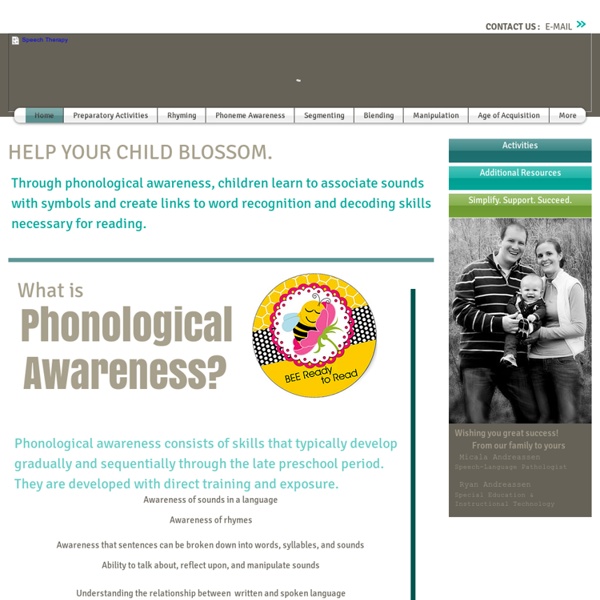



Phonological and Phonemic Awareness Phonological awareness is a broad skill that includes identifying and manipulating units of oral language – parts such as words, syllables, and onsets and rimes. Children who have phonological awareness are able to identify and make oral rhymes, can clap out the number of syllables in a word, and can recognize words with the same initial sounds like 'money' and 'mother.' Phonemic awareness refers to the specific ability to focus on and manipulate individual sounds (phonemes) in spoken words. Phonemes are the smallest units comprising spoken language. Phonemes combine to form syllables and words. Students at risk for reading difficulty often have lower levels of phonological awareness and phonemic awareness than do their classmates. What the problem looks like A kid's perspective: What this feels like to me Children will usually express their frustration and difficulties in a general way, with statements like "I hate reading!" I don't know any words that rhyme with cat. How to help
The Reading Treehouse How Spelling Supports Reading And why it is more regular and predictable than you may think Much about spelling is puzzling. Our society expects that any educated person can spell, yet literate adults commonly characterize themselves as poor spellers and make spelling mistakes. Many children have trouble spelling, but we do not know how many, or in relation to what standard, because state accountability assessments seldom include a direct measure of spelling competence. Few state standards specify what, exactly, a student at each grade level should be able to spell, and most subsume spelling under broad topics such as written composition and language proficiency. State writing tests may not even score children on spelling accuracy, as they prefer to lump it in with other “mechanical” skills in the scoring rubrics. But what about spell check? Clearly, the research base for claiming that spelling is important for young children is solid: Learning to spell enhances children’s reading and writing. Back to top Louisa C.
Phonological Awareness Glossary of Reading Terms - The Cognitive Foundations of Learning to Read: A Framework The study of reading is a science with roots in many domains; linguists study reading, psychologists study reading, educators study reading, even computer scientists are studying reading. The process of reading has been dissected and examined from a variety of perspectives, and experts in the field have had to adopt and modify terminology or generate new terminology to describe what their examinations have revealed. Unfortunately, all of this new and precise technical terminology can be confusing - it is necessary when you are trying to describe a precise concept, but there are so many concepts in reading and reading instruction that the terminology can interfere with clear communication at times. The Reading Coherence Initiative (RCI) at the Southwest Educational Development Laboratory has put together this glossary of terms related to reading and reading instruction so that people can quickly and easily check terms as they encounter them.
Phonemic Awareness on Pinteres Phonemic Awareness: Concepts and Research Concepts and Research Phonemic Awareness (PA) is: the ability to hear and manipulate the sounds in spoken words and the understanding that spoken words and syllables are made up of sequences of speech sounds (Yopp, 1992; see References). essential to learning to read in an alphabetic writing system, because letters represent sounds or phonemes. An important distinction: Phonemic awareness is NOT phonics. Phonemic Awareness is important ... It requires readers to notice how letters represent sounds. ...but difficult: Although there are 26 letters in the English language, there are approximately 40 phonemes, or sound units, in the English language. Go to top of page Definitions of key PA terminology: Phoneme: A phoneme is a speech sound. Examples of Phonemes The word "sun" has three phonemes: /s/ /u/ /n/. The word "shut" also has three phonemes: /sh/ /u/ /t/. Examples of Phonemic Awareness Skills Blending: What word am I trying to say? What Does the Lack of Phonemic Awareness Look Like?
Phonemic Awareness Activities
This site has a bunch of activities to help teachers and parents help kiddos with sounds! by sblowers Jun 6
A website full of resources on phonological awareness. by jortega Mar 12
Website with tons of activities and resources to help children learn to associate sounds with symbols by mlopezflores Mar 10